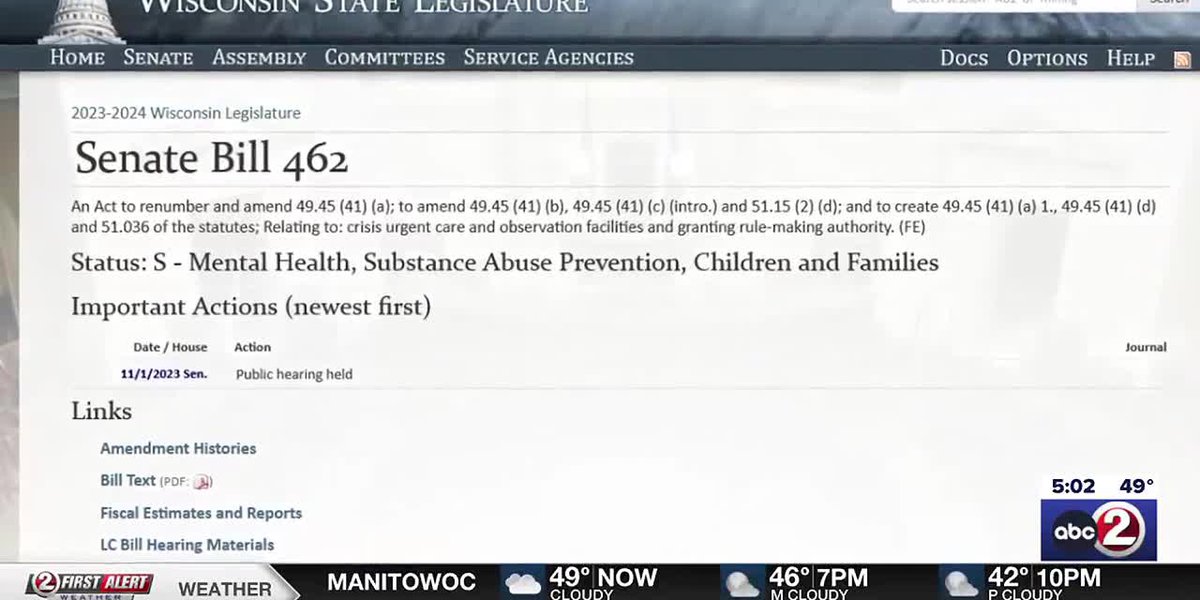
GREEN BAY, Wis. (WBAY) – Some people in Wisconsin travel hours to seek urgent mental health care.
A bipartisan bill would create regional mental health crisis centers and observation centers statewide to help rural areas in particular.
This week, committees in both the Senate and the Assembly got a closer look at this bipartisan legislation.
We spoke with mental health professionals in northeast Wisconsin who say there is a need for care closer to home.
“We have not had the resources available to get people connected,” says Jesse Heffernan, the founder of Helios Recovery Services, speaking on the state of mental health care in Wisconsin.
He says there are promising aspects of Senate Bill 462 and Assembly Bill 467, new legislation that requires the state’s Department of Health Services to have a process for treatment facilities for people with mental health or substance abuse disorders.
“I feel confident that, with the number of peer workers that we have and the number of folks that are involved with mental health, we will be able to meet the demand,” says Heffernan.
The facilities will be designed to be a “one-stop shop” for individuals experiencing a mental health crisis and will accept both voluntary and involuntary individuals for short-term stays of 5 days or less.
“I would say my hope is that, when we talk about access to mental healthcare, everyone would realize it is a spectrum that everyone needs to be able to talk about. Their mental health is as important as their physical health.”
Supporters say this would cut down on the amount of time someone in crisis would spend with law enforcement and would get them into care faster and closer to home.
While there are promising aspects, health advocates we spoke with like Heffernan say they want lawmakers to be careful. While most agree we need more access to quality care, we have to be careful when it comes to an individual’s rights and the bill’s language when it comes to ‘involuntary’ care.
Heffernan says we have to be careful when using the word ‘involuntary’ in mental health legislation.
He pointed out these sections in the bill he says are problematic:
“accept referrals for crisis services for adults, and, if applicable, for youth, including involuntary patients under emergency detention, walk-ins, and individuals brought by law enforcement, emergency medical responders or emergency medical services practitioners, or county crisis personnel;” and “allow for voluntary and involuntary treatment of individuals in crisis as a means to avoid unnecessary placement of those individuals in hospital inpatient beds and allow for an effective conversion to voluntary stabilization when warranted in the same setting;”
We also spoke with Paula Verrett, the Fox Valley director of the National Alliance on Mental Illness.
She says Wisconsin has a need for many different types of mental health care.
“We don’t have a diversified system of care that could meet the needs of the broad spectrum of need for people with mental health challenges.” Verrett told us.
She says while she wants to take a closer look at this bill and others, the need is extreme for access to the highest level of mental health care.
“Currently our crisis system is in crisis. 988 was a step in the right direction but there’s so much we can do differently.”
The latest two-year budget set aside 10 million dollars for the DHS to develop a grant program to support these facilities.
Wednesday, DHS Secretary Designee Kirsten Johnson released this statement regarding Senate Bill 462:
“Addressing the lack of treatment options for Wisconsinites experiencing a mental health crisis has been one of our agency’s top priorities. Far too many people who are in crisis are brought to an emergency room with a long wait time and transferred to a mental health facility while in law enforcement custody, which can exacerbate a crisis. The mental health facilities are often far from their home and loved ones.
SB 462 provides a significant and meaningful step in creating needed infrastructure to address these issues. Under the bill, DHS would be required to establish a certification process for crisis urgent care and observation facilities. These centers would provide both voluntary and emergency detention crisis services to youth and adults in a calm, home-like environment on a 24/7 basis. Services would include assessments for physical health, substance use, mental health crisis including suicidality and would provide stabilization services to people who are appropriate for this care setting. These centers would offer a first responder drop-off area as well as accept people walking in to receive services.
This solution comes after years of dialogue and collaboration with our partners across the state and members of the legislature. We are eager to continue working with the legislature on this critical piece of legislation.”
Copyright 2023 WBAY. All rights reserved.
